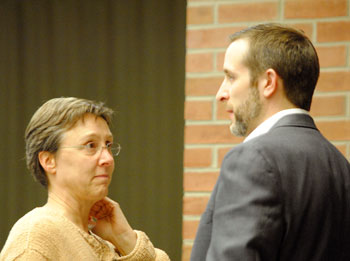Local Development Finance Authority board meeting (June 12, 2012): At its Tuesday morning meeting, the board of the LDFA took action on a number of significant items, including an approval of annual revisions to the LDFA’s contract with Ann Arbor SPARK to operate a business accelerator/incubator. SPARK is this region’s economic development agency.

Extract from the marked-up version of revisions to the contract between Ann Arbor SPARK and the Local Development Finance Authority (LDFA).
Besides the usual housekeeping changes (like changing the year from 2012 to 2013), substantive revisions to the SPARK contract include the following: (1) eliminating support for angel investment groups; (2) adding licensed software to be provided by SPARK to incubator clients; and (3) adding a new talent-retention internship program.
Another significant deletion from the SPARK contract is $5,000 annually for maintenance of a web-based educational module for entrepreneurs, called Cantillon. According to an LDFA resolution from early this year, the LDFA had invested around $170,000 over the course of five years in the self-paced program, which integrates feedback from a mentor. The tool had been used by SPARK for its Entrepreneur Boot Camps and in other venues. However, a formal request for proposals to commercialize it – to license and market the software to a broader audience – did not result in a deal.
The initial RFP was issued last year, in August 2011, and elicited no responses. On re-issuance of the RFP, Kurt Riegger’s Business Engines was the only respondent. Riegger had been the developer of Cantillon. After negotiation, Riegger and the LDFA were not able to reach mutually agreeable terms. With the failure to reach an agreement, and the elimination of the item from the LDFA’s contract with SPARK, the Cantillon education module was characterized by city CFO Tom Crawford after the meeting as “on the shelf.” Cantillon will not be offered as a part of SPARK’s September 2012 Boot Camp.
In other business, the LDFA board approved SPARK’s marketing plan. A video that was presented to the board as part of that plan got a positive reaction from LDFA board member Stephen Rapundalo. He appreciated the fact that it focused on support for entrepreneurs, as opposed to enhancing SPARK’s efforts “across the board.” SPARK has a broader mission and other funding sources than just what’s expressed in its contract with the LDFA – but the contract is focused on supporting entrepreneurs in the development of new businesses. So Rapundalo wondered if it were possible for SPARK to put all of its LDFA-funded marketing budget towards that same entrepreneurial focus.
Skip Simms, SPARK’s vice president for entrepreneurial business development, told LDFA board members at their June 12 meeting that it’s possible he might be bringing them a proposal for a significant additional financial request. That request, Simms said, would be for an additional incubator that would provide Class A “wet lab” space. He said the amount he’d request would be consistent with the LDFA’s 15% fund balance reserve policy, and would only target the portion of the fund balance that exceeds the 15% level. For the recently approved FY 2013 LDFA budget, that works out to a maximum of around $157,000. Simms sits on the LDFA board as a non-voting ex officio member.
Reaction by LDFA board members to the wet lab incubator idea that Simms floated was extremely guarded. But they appeared to be open to being convinced – if they were to hear a clear business plan and case for the need for additional local wet lab resources for start-up companies.
It’s worth noting that the LDFA’s contract with SPARK is separate from the support that SPARK receives from the city of Ann Arbor, which has amounted to $75,000 annually for the last few years. The city’s $75,000 contract with SPARK for business support services is on next Monday’s June 18 city council agenda.
The full LDFA report begins with some brief background on the LDFA itself. [Full Story]






